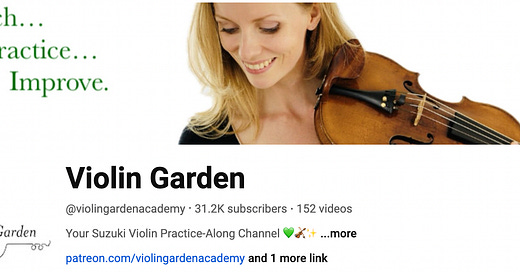The Well-Tempered Children
A violin teacher in Vienna shows how music can be the basis of a child's entire education and development.
In 1722, Johann Sebastian Bach published a collection of music he titled the Well-Tempered Clavier “for the profit and use of musical youth desirous of learning, and especially for the pastime of those already skilled in this study." The collection consists of preludes and fugues in all 24 keys, major and minor. Its title refers to his tuning system that works equally well in all keys.
Bach remains famous for his extraordinary musical creativity. Composition was his labor of love for music and for his Christian God. Many professional musicians have told me they still frequently marvel at the intricate quality of Bach’s music, even though they’ve been listening to it for decades.
Somewhere I heard someone talking about a classical Greek concept for the love we naturally feel for something when we work on it. I can’t remember the classical Greek word, but I found a modern Greek word (deriving from Turkish) that means the same thing. The word is Meraki.
In the act of working on something, we invest ourselves in it. In this act, we come to love the object of our work in which we see a reflection of ourselves. Working hard to learn a skill and to create new things can transform our lives from being agitated, negative and antagonistic to being calm, joyful, and harmonious.
A dark and inverted expression of meraki was portrayed in the film The Bridge on the River Kwai, when the British army engineer, Major Nicholson, falls in love with the bridge he built for the Japanese Army. So engrossed is he in building the beautiful bridge that he more or less forgets he is a POW who is treated harshly by the Japanese Army.
Thinking about meraki reminded me of a remark made by my philosophy professor, Roger Scruton. As he put it: “Given how short life is, we should spend most of it working on things we love.”
On a recent trip to Vienna I was invited to dinner at the home of my old friend Michael Gutierrez and his wife Anna Lea, who are both professional violinists. I had not seen them in years. The first thing I noticed when I walked into their apartment was their two daughters, age 12 and 15, standing in the entrance hall to greet me. They were polite and respectful but also relaxed. I was instantly moved by their exhibition of perfect manners.
Over dinner, Anna Lea told me about her YouTube Channel called VIOLIN GARDEN in which she provides a series of violin lessons using the Suzuki Method.
After dinner, one of her daughter’s performed a Paganini piece for me, the other a piece by Mozart. Their musical performances struck me as yet another expression of their excellent education, which was also evident from their sophisticated contributions to our dinner conversation.
Both girls seemed perfectly comfortable in their own skins. In spite of being midstream in adolescence, the older girl displayed none of the awkwardness or neurosis of that difficult phase of life.
I’m pretty sure that their dedication to learning the violin is the cornerstone of their intellectual and spiritual development. If you have kids, please consider encouraging them to study violin and to subscribe to Violin Garden.






There’s a small local museum, not often open, that I was fortunate to visit once. It was a school museum containing all the materials and books from around the turn of the 20th century. All the primary books were song books. Children learned to read music, read the words, and sing the songs in parts.
Musical education is the best education there is—which is probably why it’s been abandoned.
Since my husband Mike passed away seven weeks ago from cancer, my grief has directed me to turn even more to my enjoyment of reading good writing. And while it’s not unusual at all for me to find tremendous enjoyment from John Leake’s writing, the “Violen Garden” really spoke to me.
I studied music from the fourth grade well into college. My Mike was a professional musician and composer and a caretaker of his instruments. I immediately understood the Meraki principle, and I found comfort in the knowledge that he had spent his life with those vintage guitars and amplifiers that he so loved.
And, for years, I designed and created sterling silver jewelry as a side business. Although I loved doing the design and creation part, I always hated to sell my creations. Now I know why. They were like my children. Thank you John Leake.